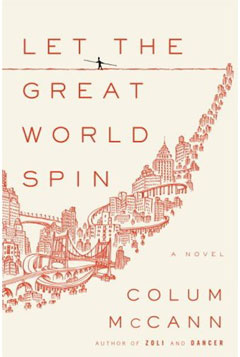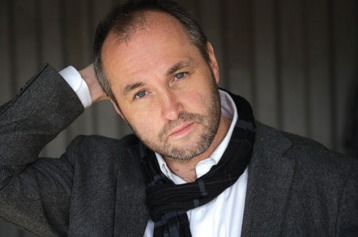Reading a novel like Colum McCann's Let the Great World Spin was equivalent to the highest quality first aid cream (Neosporin + pain relief). Under the covers, I wrapped my ankle around the other and read, page after page, night after night. We (because Ryan read the book a few days before I did) found a simple satisfaction in McCann's tightly woven plot. We decided on a name for our son too (I like to plan ahead).
Colum McCann is a transplant to New York City, and brings a fresh eye to the pulsing, interconnected web of that dynamic place. The story hinges on one true event in the 1970's, a day in which Philippe Petit walked across the Twin Towers on a tight rope, suspended thousands of feet in the air. While such a feet is still fascinating to the contemporary mind, the event serves as a common denominator instead of the main focus. McCann will pan to the acrobat in air but zooms in on the lives of others, of common people who experience the city in a myriad of ways.
Two of the central characters are Irish, like Colum. Ciaran is a rather aimless young man, disillusioned by his home and eager for greater connection. His brother, Corrigan, is a monk (more unconventional than most) and a man trying to reconcile his passion for God with his passion for living.
Through Corrigan's ministry, Ciaran is introduced to the gritty world of New York hookers, pimps and drugs. The reader is also given an intimate introduction to the women who work the streets, women that are both fragile and indomitable.
But this novel refuses to settle. McCann moves the reader from one perspective to the next, shifting his voice as he narrates the thoughts and actions of several different yet somehow connected characters. From a pair of Irish brothers, to an upper-class mother who has lost her son, to a tight rope walker that dared to defy, to a burnt-out whore, McCann moves through these lives with seamless transition. Although the reader may not understand how or if these disparate lives will work to create a whole, McCann inspires enough confidence to compel continued trust...and not only trust, but an intense desire to explore further this mad and inspiring world of city living.
Ultimately this novel is about love and loss. This novel is about holding on to those that we love, despite the apparent lack of hope or possible reconciliation. In many ways, this novel speaks to the great loss of 9/11. The beauty and the terror of the towers is eloquently conveyed in the acrobatic act of defiance that captured the imagination and the hearts of many New Yorkers. Even then, the danger and beauty of those imposing architectural feats was apparent, and as Pierre walks and dances across the cable that stretches between them, the contemporary reader feels the current hollowness of the city skyline; there is no escaping the realization that such creative possibility no longer exists.
And while McCann does not begin to delve into the layers and layers of terror and loss that occurred on that fateful day, he presents his readers with stories and people that are compelled by love and are often scarred by loss. McCann's first person narration shifts from one character to the next, and for the most part, he succeeds at presenting the reader with genuine human experience (his one downfall is his portrayal of a middle-aged African American hooker, which read hollow to me). But if you are searching for a novel that will stir you, that will encourage you to look at your community with fresh eyes, than I suggest no other novel than McCann's great work.


 RSS Feed
RSS Feed
